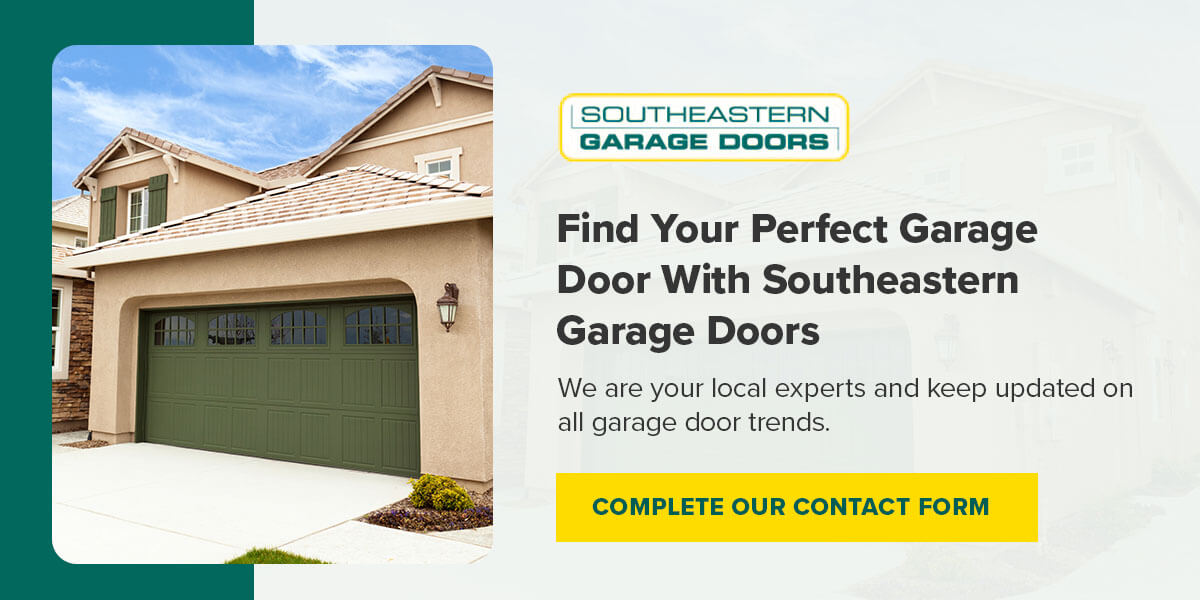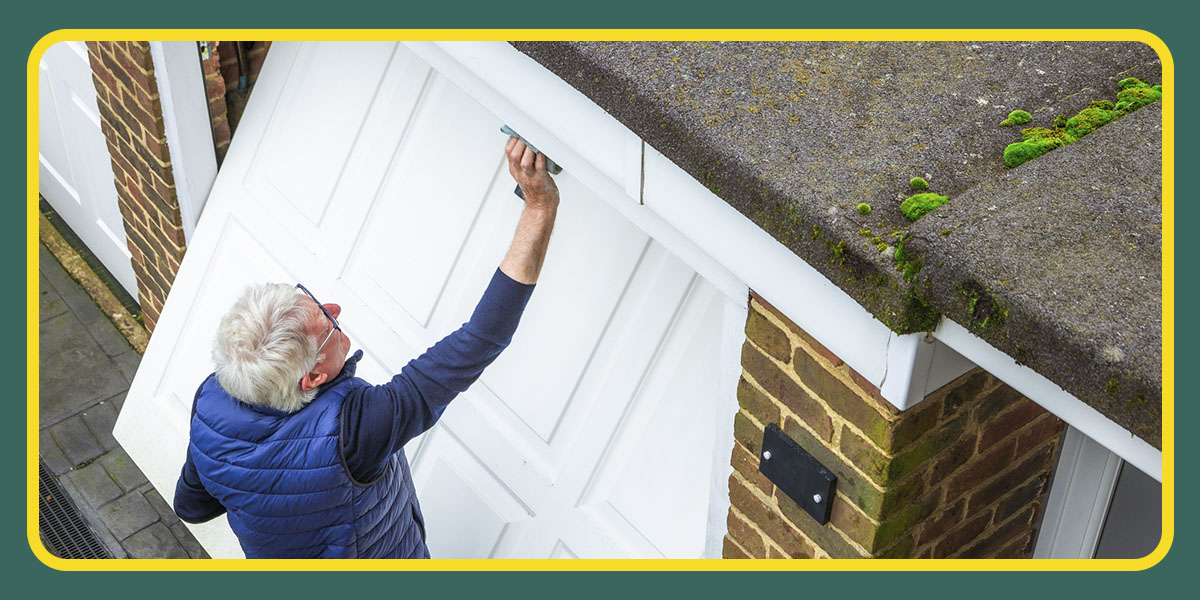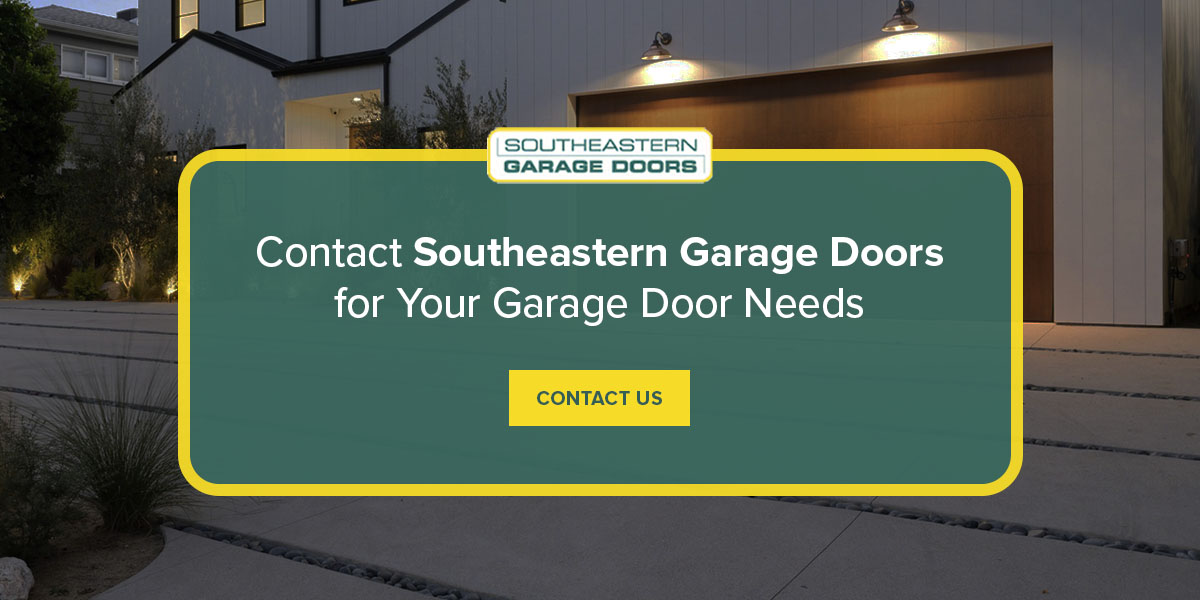Top Garage Door Trends of 2025
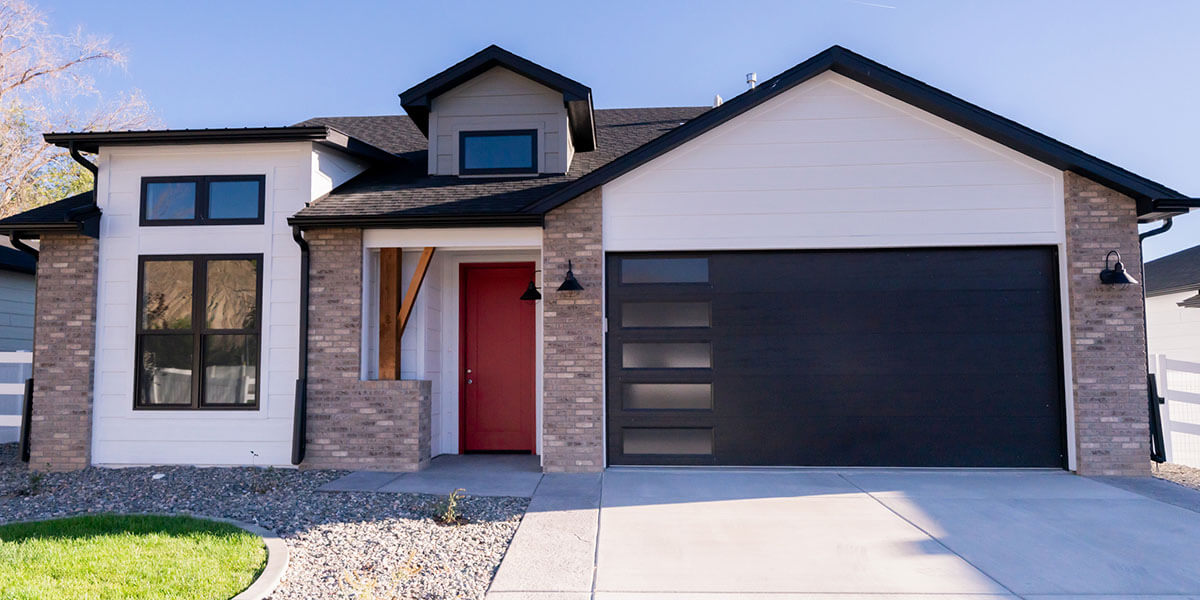
For years, garage doors served as functional pieces to cover the garage and add privacy to your home. Recently, however, they’ve evolved into designer statements, with aesthetics being just as important as function.
The top garage door trends of 2025 show no signs of slowing down, with sleek lines and the latest technology promising attractive, convenient investments.
A Quick Glance at Some Overarching Themes
Modern garage door trends are all about minimalism, innovation and comfort. Whether you enjoy standing out from the crowd or blending in with your neighborhood, there’s a trend for you. At a quick glance, some of the universal themes you’ll notice include:
- Modern aesthetics.
- Bold colors.
- Smart technology integration.
- Innovative materials.
These elements weave into the major trends, influencing garage door styles, materials, colors and features.
Modern Garage Door Styles Gaining Traction
Modern garage door styles feature flush panels, clean lines and glass incorporated into the designs. These styles create a minimalist, contemporary look that best complements modern architecture.
At the same time, traditional styles are being revamped for a more modern look, which can blend well with any property’s architectural style.
The Rise of Glass Panel Doors
Full-view or glass-paneled garage doors, like Clopay®’s VertiStack® Avante®, maximize natural light and connect indoor and outdoor spaces. They can be clear, frosted or tinted and add unmistakable sophistication to home gyms, open living areas and other nontraditional spaces.
Carriage House Doors Reimagined
For those who prefer a modern twist to classic beauty, carriage house garage door styles are being updated. More of these doors feature modern materials, quality faux wood finishes, recessed and long panel designs and cleaner lines. These features make them suitable for contemporary and traditional homes.
Custom Garage Doors
Many homeowners are seeing the value in customizing their garage door to fit their property and needs. Customization can add value to the home, especially if the door is tailored to the property’s unique architecture. Whether creating a cohesive look or getting a bigger garage door, a custom door is built for your home.
What Garage Door Materials Are Trending?
The trending garage door materials balance ease of maintenance, durability and aesthetics. Modern materials should be convenient while protecting the door and adding to its beauty.
Durable and Stylish Aluminum
Though it’s always been relatively popular, aluminum is becoming more in demand due to its lightweight and versatile nature. It’s also resistant to rust and corrosion, making it a go-to choice for coastal properties. With its low maintenance and sleek aesthetic, aluminum is an excellent material to consider in 2025 and beyond.
Low-Maintenance Steel
Steel is a durable material that more modern property owners are choosing to invest in. Galvanized products are rust-resistant, and you can customize the panels and color to your liking. They’re also easy to clean, which suits busy homeowners.
Composites
Composites offer the best of both worlds, providing the beauty and strength of wood with the ease of maintenance of steel. Composite is an excellent wood alternative and won’t rot or warp, making it ideal for humid climates.
Popular Garage Door Color Trends
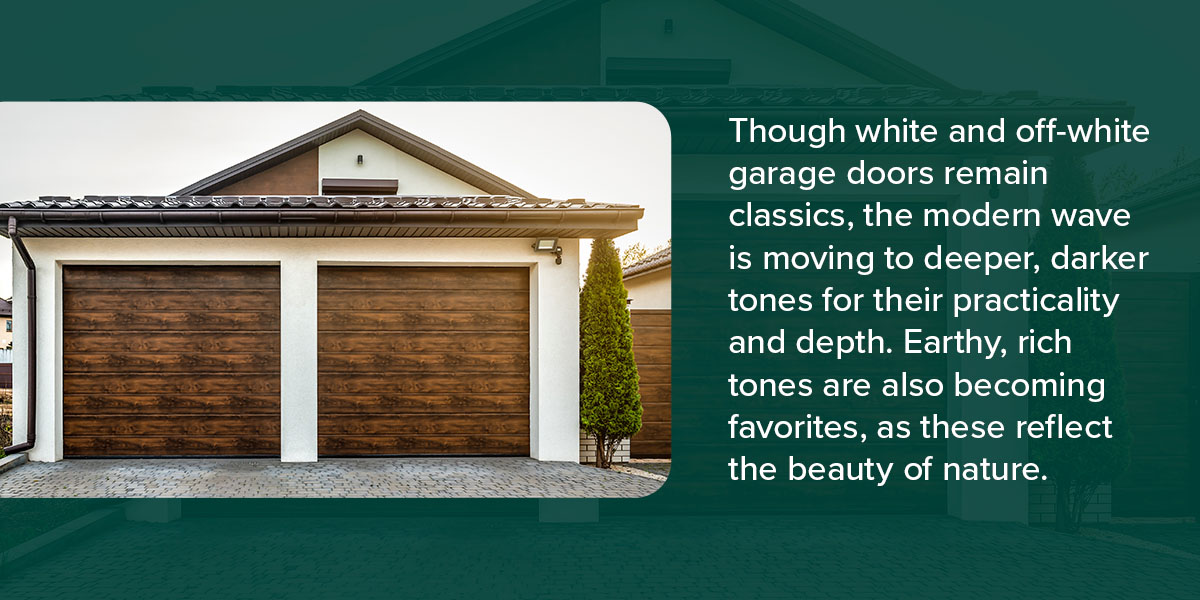
Though white and off-white garage doors remain classics, the modern wave is moving to deeper, darker tones for their practicality and depth. Earthy, rich tones are also becoming favorites, as these reflect the beauty of nature.
Bold and Moody Hues
Black, charcoal and deep blues hide dirt and wear and tear while remaining timeless and sophisticated. These dark colors are often paired with metallic hardware or light siding or walls, creating a striking contrast.
Warm, Natural-Looking Finishes
Wood-look finishes on steel or composite doors add the warmth and character of wood without the high maintenance. Dark greens and browns invite an earthy aesthetic, adding to the property’s character.
Innovative Garage Door Features
Security is becoming more important for homeowners, and technology is one trend set to grow in 2025 and beyond. These smart features enhance the functionality of modern garage doors, giving property owners more control and peace of mind.
Similarly, energy-efficient insulated doors are a must for every modern property, as they help air conditioners and heaters not work as hard.
Smart Home Integration
When it comes to the latest garage door technology, smart home integration is becoming a nonnegotiable. These systems turn your home into a smart hub with Wi-Fi-enabled openers, remote access, voice assistants and optional video surveillance.
Smart home integration boosts security. You can get live notifications when your garage door opens and closes, and you can close the door from anywhere. Keypads complement the system, as they’re child-friendly and eliminate the need for keys. New, modern openers also use rolling code technology, which makes cloning or hacking the system nearly impossible.
Energy-Efficient Doors
More people are trying to reduce their carbon footprint by using less power from their AC, and getting an insulated garage door is one of the most effective ways to do so. A properly insulated garage door keeps cool air inside, which is especially useful for South Carolina’s hot summers.
Top South Carolina Garage Door Trends
South Carolina is a beautiful state with stunning architecture and warm weather. These unique features can also impact finding the right garage door, especially when you’re keeping an eye on popular themes. These top South Carolina garage door trends contain many elements from the national trends, while customizing them to fit the Palmetto State:
- Durable materials: South Carolina’s humid, subtropical climate makes garage doors susceptible to moisture and high heat. Some areas also have coastal salty air, calling for robust and corrosion-resistant garage door materials. Ideal ones include aluminum and galvanized steel with wood-look finishes and composites.
- Modern carriage house and custom styles: With a rich mix of traditional Southern and contemporary architecture, South Carolina homeowners enjoy an eclectic mix of home styles and can experiment with garage doors. Colonial and period-inspired properties will work well with a modern carriage house or a custom door. In contrast, glass-panel garage doors can accentuate the beauty of contemporary or coastal properties.
- Emphasis on insulation: An insulated garage door keeps cool air inside and warm air outside during South Carolina’s hotter months. More local residents are turning to insulated doors, as these keep the indoor temperatures comfortable while giving your AC a break.
- Interesting colors: From Charleston’s beach houses to historic buildings and modern homes, South Carolina has a tapestry of different architectural styles and colors that suit bolder, on-trend garage door colors. From black to vibrant blue and rustic earth tones, garage door colors can reflect the unique spirit of local architectural styles.
Find Your Perfect Garage Door With Southeastern Garage Doors
These top garage door trends of 2025 can deliver lasting style and appeal, with practical elements for South Carolina homes. At Southeastern Garage Doors, we are your local experts and keep updated on all garage door trends.
As a proud Clopay partner, we carry various product lines that suit the trends of 2025 and beyond, including VertiStack® Avante®, Canyon Ridge® Carriage House and Modern Steel™. To get expert assistance on finding the right garage door for your home, complete our contact form today.
How to Know When to Replace Your Garage Door
Garage doors last a long time due to their robust construction. With proper care and maintenance, they can last well over a decade. Like most mechanical systems, garage doors experience wear and tear with every cycle. Eventually, you’ll need to go beyond performing repairs and upgrade your door.
So, how do you know if you need a new garage door? This guide takes you through key considerations for updating your garage door system.
How Often Should a Garage Door Be Replaced?
How often you’ll need a complete garage door replacement depends on various factors, such as:
- Door quality: Garage doors with high-quality construction and top-of-the-line technologies are designed to be more durable and are less likely to break down prematurely than lower-quality options.
- Materials: Garage doors can be made from wood, fiberglass or metal. Each of these materials wears out differently.
- Frequency of use: How often you use a garage door determines how long it will last. If you operate it frequently, its parts will likely wear faster.
- Maintenance: Garage doors without proper routine maintenance may break down sooner than those regularly cleaned, inspected and repaired by a professional.
- Weather conditions: Extreme weather conditions can shorten garage door life spans.
When to Replace Your Garage Door
So, should you replace or repair your garage door? Several factors determine repairs and replacements. Usually, when the door is relatively new, doesn’t have major issues and is in fairly good condition, all it needs are repairs, like damaged garage door springs or tracks.
The following factors indicate that repairs are not enough and that it’s time to replace your garage door.
Expired Service Life
What is the average life span of a garage door? Most garage doors last 15 to 30 years when properly cared for.
As your door experiences wear and tear, it becomes more vulnerable and costly to repair over time. If the door is nearing or past its service life, repairs won’t restore optimal performance. It’s time for a replacement. Look out for serious signs of wear and tear consistent with age, such as corrosion, decay, warping and multiple worn parts.
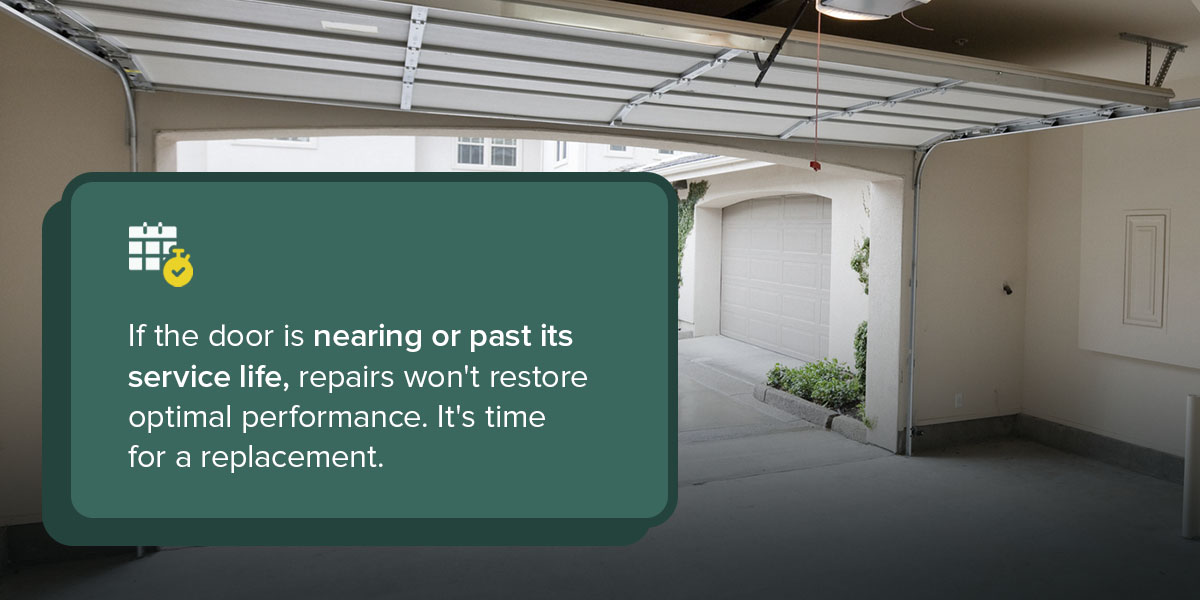
Extensive Damage
Usually, professional service and repairs take care of issues associated with regular use and exposure to the elements unless the extent of damage is beyond repair. Severe damage that weakens the door’s structure makes a replacement more ideal.
It’s also best to replace the door if it has suffered deterioration to multiple key components, such as panels, tracks and springs. Since severe structural damage and multiple failures tend to be costly to fix, installing a new garage door can be a more reliable and cost-effective solution.
Frequent Malfunctions
If your garage door continuously breaks down, it’s time to consider a replacement. Having to frequently fix broken parts is not reliable or cost-effective in the long run. Keep in mind that with each malfunction, the door may weaken and reduce efficiency. Investing in a new system is probably best for your household and wallet.
Poor Performance
Your garage door may appear fine but with a noticeable difference in performance. While you may still operate the door, performance issues like difficulty opening and closing can be a sign of significant wear and tear. You may also notice that your garage door produces excessive noises like grinding, knocking and squealing during operation.
If the unusual noises are accompanied by other issues, such as shaking or dragging, it’s likely to be a serious mechanical failure. A total upgrade is your best option here.
Outdated Style and Technology
A garage door that’s more than a decade old is likely to be out of style. Even with a timeless design that matches your home’s aesthetics, after many years of use, your door may show obvious signs of age that a paint job alone won’t conceal.
Due to frequent advancements in the garage door industry, older models are likely to possess outdated technologies that impact performance, safety and security. A replacement is the best way to enjoy the latest garage door features, like multi-layer construction, that enhance durability and noise reduction for quiet operation.
High Energy Bills
Are you noticing higher utility bills? Is your garage especially hot and humid in the summer or cold in the winter? Older garage doors may lack quality insulation and seals to keep conditioned air in and outside air out — that translates to high costs and wasted energy. If your garage door is not energy-efficient, it’s best to replace it with a top-performing insulated garage door to save on energy costs.
Why Is a Garage Door Replacement Important?
It’s tempting to prioritize repairs over a replacement if your garage door looks like it can serve you a little longer. So why opt for a new garage door? Here are some of the benefits of a garage door replacement:
- Improved performance: A garage door that’s at the end of its working life reaches a point when no amount of maintenance will restore its previous functioning. Installing a new door comes with more advanced features that improve overall performance, efficiency and convenience.
- Better insulation: Garage doors today have better design and insulation. By upgrading to a model with advanced insulation technology, you enjoy better temperature regulation throughout the hot and cold months, translating to reduced energy bills.
- Improved appearance: Over time, your garage door will show signs of wear due to years of use and exposure to the elements. A new door has a fresh and updated look, enhancing your home’s overall appearance.
- Increased home value: Since a garage door takes up a significant portion of your home’s exterior, its appearance contributes to your home’s overall curb appeal. Replacing your garage door increases your property value, offering almost double the return on investment. As a result, a garage door replacement is the most profitable remodeling project for homeowners.
- Reduced maintenance: New doors run for a long time without much maintenance because they have parts that are not yet worn. Compared to an older garage door that is more susceptible to maintenance issues, a new unit saves you the costs and time you invest in frequent breakdowns.
Contact Southeastern Garage Doors for Your Garage Door Needs
Garage doors thrive with proper maintenance, which includes basic upkeep and professional servicing. However, excessive damage, wear and tear, and other inconveniences like frequent repairs indicate it is time for a new garage door installation. For residents of the Charleston Trident area, Southeastern Garage Doors offers top-of-the-line garage doors and expert-driven same-day service.
With 100 years of combined experience under our belt, you can count on our ability to match you with a product that complements your home in addition to reliable services. Fill out our contact form to request an estimate for a new garage door or a service!
Top Garage Doors for Coastal Climates: Durability & Style
Living on the coast is a dream come true for many. When you own a home, it is important to consider how the climate impacts your property’s various aspects, including your garage door choice. Your garage door needs to be durable and reliable for several reasons — it is your home’s biggest entry point, so it must help secure and protect your home, insulate it for greater energy efficiency, provide privacy and add curb appeal to your property.
On the coast, there are also extra considerations to keep in mind because of the humid, salty air. This coastal garage door guide explores top considerations, including the best garage door materials for coastal homes. The guide also takes a look at coastal garage door styles and how to balance style with function.
Important Considerations for Garage Doors in Coastal Climates
Consider these tips for choosing a coastal home garage door that will last:
- Look for rust-resistant materials: The humid, salty air of a coastal climate can quickly cause materials to rust. Choose a garage door made from corrosion-resistant materials to withstand the conditions.
- Find a garage door with a high-quality finish: A high-quality finish provides an added barrier against salt, moisture and strong winds. A UV-resistant finish can also prevent paint and other coatings from fading and cracking, so your garage door retains its appearance for longer.
- Consider the correct R-value: The R-value measures how insulating garage doors are. It is important for making your home more energy-efficient, especially in coastal areas that experience a range of weather conditions throughout the seasons. A good R-value for coastal garage doors is R-12 to R-18. Doors in this range offer a fairly good amount of insulation and energy efficiency, as well as wind resistance and moisture protection.
- Look for wind-resistant features: Coastal regions generally experience high winds, so you need a garage door that can withstand the constant battering. Look for doors with a reinforced structure that includes bracing, heavy-duty hinges and rollers, a reinforced track and weatherstripping that helps seal your garage against wind.
What Garage Door Material Is Best for Coastal Homes?
A garage door for a coastal house must be weather-resistant and hold up against rust, corrosion and mold. Here are some of the best materials for coastal garage doors.

Aluminum
Aluminum is an excellent material for components around a coastal home. It has a low iron content, so it will not rust. It is also a lightweight material, which means the overall weight of the door places less strain on the garage door system’s other mechanisms. The lightweight construction can help other components last longer.
Despite the lightweight construction, aluminum has an excellent strength-to-weight ratio that can withstand strong winds. Additionally, aluminum is UV-resistant and does not fade or weaken with prolonged exposure to the sun. It is also moisture-resistant. Aluminum is a lower-maintenance material than steel and has a long lifespan, offering a good long-term value.
Steel With Protective Coatings
Steel offers superior strength and impact resistance to aluminum. It is an ideal choice for durable applications, but it has to be treated to be an effective option for coastal homes. Galvanized steel has been treated with a zinc coating to improve its corrosion resistance. Steel can also be coated with other anti-corrosive materials. The protective barrier allows you to have a durable, reinforced steel door and helps protect the steel from moisture and salt. Be sure to ask your garage door specialist for doors with a thick galvanized coating for your coastal home.
Composites and Other Materials
Composite materials like wood and urethane may suit coastal home garage doors. Wood composites use wood fibers but combine them with more durable materials to have a more weather-resistant, long-lasting door. Urethane, or faux wood, is similar to wood composite. You may also explore fiberglass and vinyl door options.
Which Garage Door Materials Are Hurricane Rated?
Exploring hurricane-rated garage doors is essential when you are in a coastal region that is prone to experiencing strong winds. Various materials provide a good level of wind and impact resistance, the best being steel, followed by aluminum, wood and urethane composite. Look for hurricane ratings on a garage door’s label, which will say whether or not it is “Impact and Cyclonic Rated.”
Style Considerations for Coastal Doors
Finding the right garage door style for your coastal home is as important as any other consideration. Your garage door is part of your property and one of the first elements you and your guests notice. With the right style, you can use your garage door to create a beautiful focal point for your property’s facade and add intrinsic value that you love and appreciate every time you pull up to your home.
Garage doors are available in a range of styles to suit your preferences. You can find garage doors in various finishes, shades and colors that complement a beach-style house. The best garage doors for beach homes are those that balance style with functionality and durability. You want good materials, coats of paint, and finishes that all last, especially in coastal conditions.
Tips you can keep in mind for aesthetically pleasing garage doors for coastal homes include:
- Choosing UV-resistant finishes to prevent rapid fading.
- Exploring lighter colors to hide salt residue and reflect heat.
- Experimenting with coastal-inspired palettes for the door’s accents, like blues, teals, sandy beiges and coral.
- Exploring garage doors with accents that are reminiscent of beach homes, like Mediterranean-inspired arches and decorative panels.
- Choosing composite garage doors with steel and a faux wood look for a natural beach style, while still enjoying durable, weather-resistant properties.
Get Quality Garage Doors and Services From Southeastern Garage Doors
A reliable garage door made with the right materials is an essential investment for coastal houses. The best types of garage doors for coastal area homes will have impact ratings and rust-resistant finishes that make your home more energy-efficient and last longer on the coast.
At Southeastern Garage Doors, we offer high-quality garage door products and outstanding garage door services. With over 100 years of combined experience in the garage door industry, you can rely on us to provide durable garage doors that can withstand coastal climates. We also offer garage door openers and professional garage door repairs for private homeowners and contractors across the Charleston Trident area.
Browse our products for coastal garage door ideas for South Carolina homes, and contact us at 843-747-6622 to discuss your garage door needs. You can also reach out online to request an estimate or request a service.
Why Won’t My Garage Door Close?
Garage doors enhance security and provide insulation for your home, but regular wear can cause operational issues that prevent them from functioning properly. If your garage door is not closing, it’s important to figure out the problem.
While you may first consider do-it-yourself methods to fix a garage door that won’t close, it is highly recommended to seek professional help. Garage doors have systems of parts that must properly work together, and some may be hazardous if you try fixing them yourself. Southeastern Garage Doors’ trusted technicians have over 100 years of combined experience. We can diagnose your problem and use specialized tools to fix it.
Symptoms of Garage Door Not Closing
When you try to determine why your garage door is not closing or going back up, confirm the sensors aren’t blocked or dirty. If there is nothing in the way and you notice any of these signs, there may be a damaged or broken part that needs a professional inspection:
- Loud banging or squeaking noises
- Misalignment
- Defective bearings
- Fallen cables
- The door falling too quickly
- Crooked or bent garage door
- Worn-out springs
The garage door cables, springs and opener are common culprits of these symptoms. Count on Southeastern Garage Doors to repair or replace them.
Broken Garage Door Cables
Garage door cables are responsible for smoothly lifting and lowering the garage door. When these snap, fray or are otherwise faulty, further damage can happen to the rest of the system, making the garage door unable to operate.
Broken Garage Door Springs
Broken springs are another culprit as to why your garage door won’t close when there’s nothing in the way. Torsion and extension springs twist to raise and lower your garage door, but these can weaken or deform. We can replace the springs so your garage door has the right amount of tension.
Broken Garage Door Opener
The garage door opener allows you to raise and lower your garage door. It consists of a motor unit, track and remote control. It is possible that the motor has overheated or the gears have worn out. The vertical or horizontal tracks may be bent — we can repair those and other concerns.
Other Possible Reasons
If your cables, springs and opener are in good shape, there are other possibilities why your garage door is not closing or going back up. The sensors may need to be realigned, the wires may have short-circuited or the rollers need to be lubricated.
No matter the symptoms, it’s best not to attempt using your garage door until it has been repaired. Doing so can cause more damage to the part or overall system.
Let Southeastern Garage Doors Repair It
When your garage door is not closing, it could be due to a number of causes, but the best solution is always to contact an expert. When you reach out to our team in Charleston, South Carolina, we deliver convenient same-day service and will work with you to find a time that fits your schedule.
For more information or to request a quote, fill out our contact form or call (843) 747-6622.

